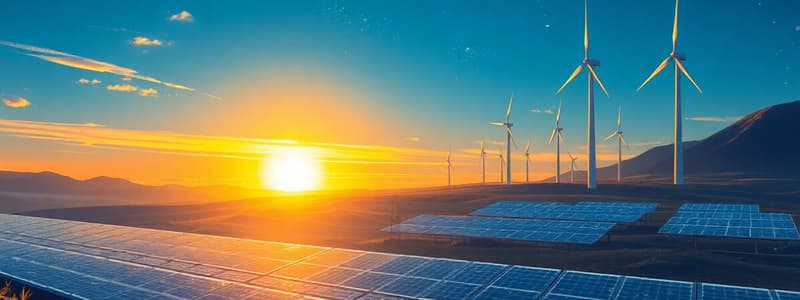Podcast
Questions and Answers
What are the main advantages of solar energy compared to fossil fuels?
What are the main advantages of solar energy compared to fossil fuels?
Solar energy is abundant, clean, and contributes to climate change mitigation.
Identify two significant challenges associated with wind energy production.
Identify two significant challenges associated with wind energy production.
Intermittency and the need for large-scale infrastructure installation.
Discuss the environmental impacts of large-scale hydropower projects.
Discuss the environmental impacts of large-scale hydropower projects.
They can lead to habitat alteration and displacement, affecting local ecosystems.
What makes geothermal energy a reliable and consistent energy source?
What makes geothermal energy a reliable and consistent energy source?
How can biomass energy achieve carbon neutrality?
How can biomass energy achieve carbon neutrality?
How can renewable energy contribute to energy security?
How can renewable energy contribute to energy security?
What economic opportunities arise from the adoption of renewable energy?
What economic opportunities arise from the adoption of renewable energy?
What are the main challenges associated with the intermittency of renewable energy sources?
What are the main challenges associated with the intermittency of renewable energy sources?
Explain the significance of policy support in the transition to renewable energy.
Explain the significance of policy support in the transition to renewable energy.
In the context of renewable energy, why is public acceptance important?
In the context of renewable energy, why is public acceptance important?
Flashcards
Renewable Energy Sources
Renewable Energy Sources
Energy sources derived from naturally replenishing resources, unlike fossil fuels.
Solar Energy
Solar Energy
Harnessing sunlight to create electricity or heat, using PV cells or CSP systems.
Wind Energy
Wind Energy
Converting wind's kinetic energy into electricity using wind turbines.
Hydropower
Hydropower
Signup and view all the flashcards
Geothermal Energy
Geothermal Energy
Signup and view all the flashcards
Renewable Energy Advantages
Renewable Energy Advantages
Signup and view all the flashcards
Renewable Energy Challenges
Renewable Energy Challenges
Signup and view all the flashcards
Renewable Energy Intermittency
Renewable Energy Intermittency
Signup and view all the flashcards
Renewable Energy Future
Renewable Energy Future
Signup and view all the flashcards
Smart Grids
Smart Grids
Signup and view all the flashcards
Study Notes
Introduction to Renewable Energy
- Renewable energy sources are derived from naturally replenishing resources, unlike fossil fuels, which take millions of years to form.
- These sources are crucial for mitigating climate change and reducing reliance on finite resources.
- Examples include solar, wind, hydro, geothermal, and biomass.
Solar Energy
- Solar energy harnesses sunlight to generate electricity or heat.
- Photovoltaic (PV) cells convert sunlight directly into electricity.
- Concentrated solar power (CSP) systems use mirrors to focus sunlight onto a receiver, producing heat that drives turbines and generates electricity.
- Solar energy is abundant, clean, and widely distributed.
- Intermittency is a key challenge, as solar generation depends on sunlight availability.
Wind Energy
- Wind energy converts wind's kinetic energy into electricity using wind turbines.
- Onshore and offshore wind farms are common implementations.
- Wind energy is a reliable source, especially in favorable locations.
- Intermittency is a challenge, and wind speed varies throughout the day and year.
- Requires large-scale infrastructure installation.
Hydropower
- Hydropower harnesses the energy of flowing or falling water to generate electricity.
- Dams are commonly used to store and divert water, turning turbines for electricity generation.
- Hydropower is a strong, consistent and reliable source of electricity.
- Large-scale hydropower projects have significant environmental impacts (e.g., habitat alteration and displacement).
- Dam construction affects water ecology.
Geothermal Energy
- Geothermal energy captures heat from the Earth's interior to generate electricity or heat buildings.
- Geothermal power plants use steam or hot water from underground reservoirs to spin turbines and produce electricity.
- Geothermal energy is dependable, consistent and continuously available.
- Significant infrastructure is needed, and geothermal resources are not uniformly distributed.
- Environmental concerns include potential release of gases and chemicals.
Biomass Energy
- Biomass energy utilizes organic matter, such as wood, agricultural residues, or municipal waste, to produce energy.
- Burning biomass releases greenhouse gases, but carbon neutrality can be achieved when sustainably sourced.
- Biomass can be used for direct heating, electricity generation or biofuels production.
- Requires careful management to ensure sustainability and environmental responsibility.
- Potential for deforestation and land use changes if not managed properly.
Advantages of Renewable Energy
- Environmental benefits: Reduced greenhouse gas emissions, lower air and water pollution compared to fossil fuels.
- Energy security: Reduced reliance on imported fuels, promoting energy independence.
- Economic opportunities: Job creation in manufacturing, installation, and maintenance of renewable energy systems.
- Sustainability: Resources replenish naturally over time, ensuring long-term energy supply.
Challenges of Renewable Energy
- Intermittency: Some sources (solar, wind) fluctuate depending on weather conditions which require energy storage or grid management solutions.
- Public acceptance: Concerns about land use, visual impact, or noise pollution of some projects.
- Infrastructure development: High upfront investment costs for large-scale projects, and expansion of the transmission grid.
- Resource variability: Uneven distribution of suitable resources across different geographic locations.
Future of Renewable Energy
- Continuous technological advancements are improving efficiency and reducing costs of renewable energy technologies.
- Policy support and government incentives play a key role in facilitating the transition to a cleaner energy future.
- Integration with smart grids and energy storage solutions are crucial for efficient management of renewable energy variability.
- Public awareness and acceptance of renewable energy technologies will drive future growth.
Studying That Suits You
Use AI to generate personalized quizzes and flashcards to suit your learning preferences.




